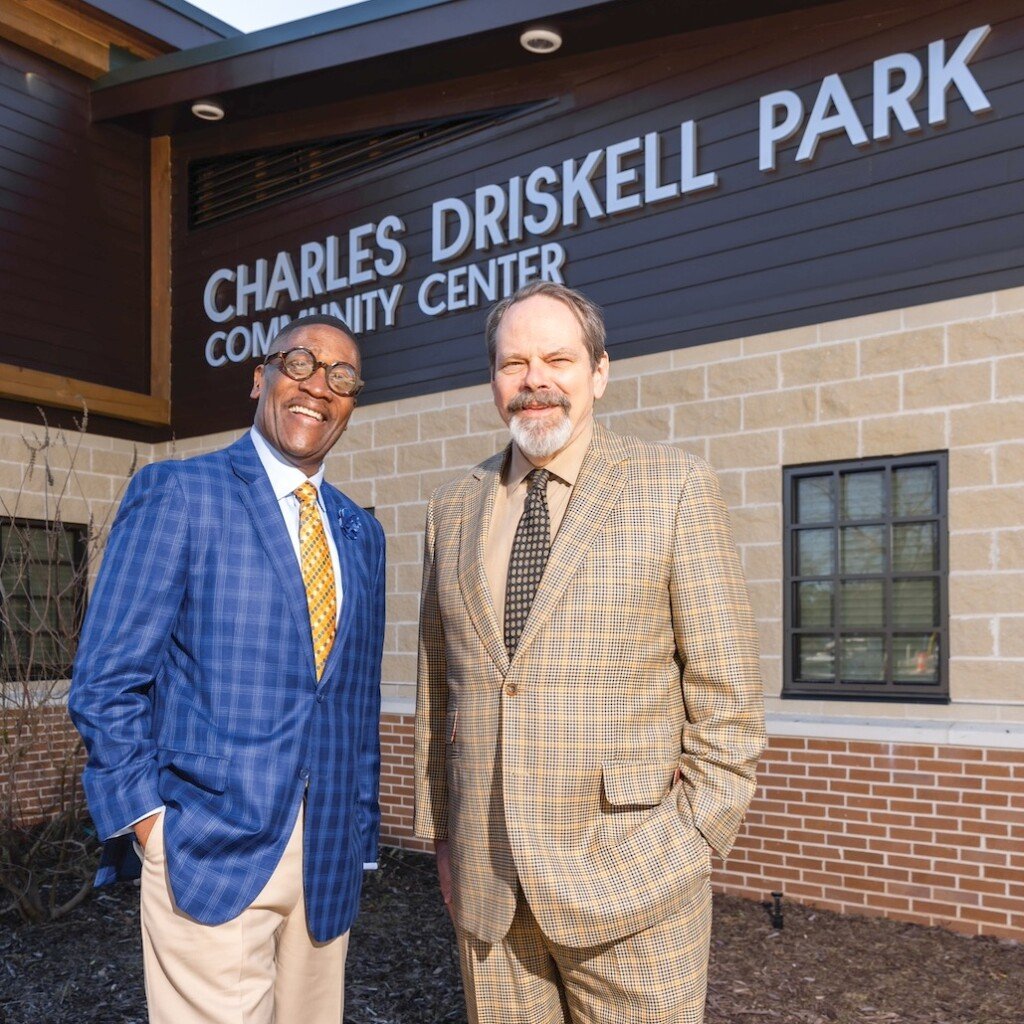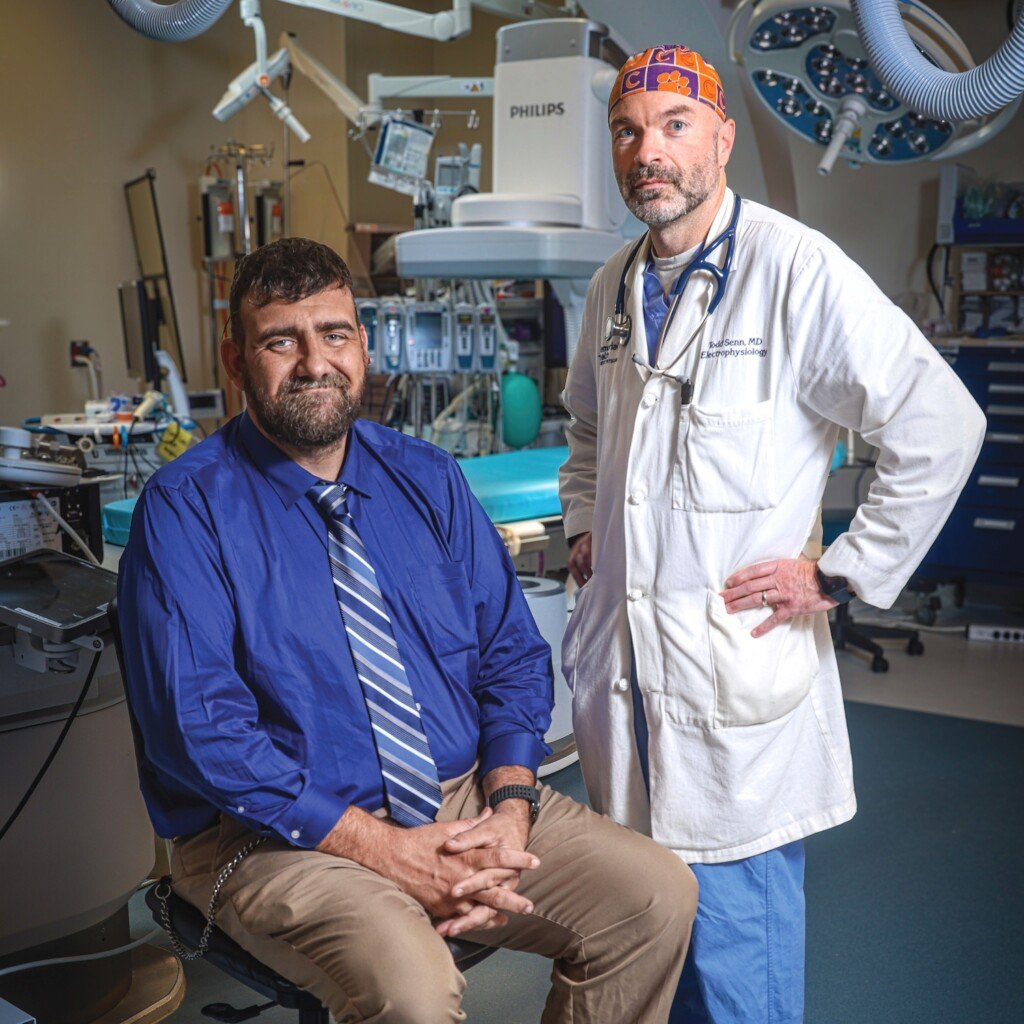Resurrecting Hope in Mental Health in Georgia
Georgia is making strides in passing and implementing mental health legislation, but there’s still work to be done.
Kevin Tanner, commissioner of the Georgia Department of Behavioral Health and Developmental Disabilities, remembers that when the historic Mental Health Parity Act was passed in 2022, the chief champion of the legislation, the late House Speaker David Ralston, stood at the rostrum in front of cheering legislators and said, “Hope won.”

New Initiatives: Kevin Tanner, commissioner of the Georgia Department of Behavioral Health and Developmental Disabilities. Photo credit: Daemon Baizan
The law was an effort to begin addressing the state’s woeful deficits in mental healthcare. And some things have improved: Tanner believes that the stigma around behavioral health issues is beginning to wane. A crucial provider rate study was done and state reimbursements for providers of mental health treatment are set to rise for the first time in decades. Tanner’s department (DBHDD, for short) created pilot programs addressing the needs of some people in the criminal justice system, and the legislature in 2024 passed a series of individual bills that funded new initiatives.
But earlier this year, Forbes Advisor ranked Georgia 49th for mental health care in the U.S. (Only Texas was worse.) Forbes noted a high percentage of adults with mental illnesses who can’t access care because of cost and a lack of insurance coverage. It also found that Georgia has the fourth fewest mental health treatment centers.
“A lot of things can be done without additional money. A lot of improvements are done with just changing and improving practices and policies, and we’re doing that.” – Kevin Tanner, commissioner, Georgia Department of Behavioral Health and Developmental Disabilities
That’s not a surprise to many of the people who labored to make the law, also known as House Bill 1013, happen, nor to those who have worked in the mental health treatment field. It’s not even necessarily a disappointment (though they wish the law was living up to its government name faster).
“The Mental Health Parity Act was designed to expand services for behavioral health and addictive disease, but it was a number of short-term initiatives and then a number of long-term initiatives,” says Dana Glass, a licensed clinical social worker and CEO of Aspire Behavioral Health and Developmental Disability Services in Albany, one of 22 nonprofit community service boards in Georgia that provide mental health services to a specific region. “So it wasn’t something [where] we expected to see the full outcome in the immediate year following it.”
After another omnibus bill (HB 520) to further expand mental health services didn’t make it out of the 2023 legislative session, this year there was support for continued efforts through annual budget appropriations and bills, but with more of a bit-by-bit approach. Kim Jones, executive director of NAMI Georgia (National Alliance on Mental Illness), notes that 18 behavioral health bills passed the legislature in the 2024 session, representing the majority of what was in HB 520 a year ago. “There are members of the Georgia Mental Health Policy Partnership who remember times when we had no bills at all,” she says. And whether it’s one bill or many, she says, “as long as it gets done and we are reforming the system, it doesn’t matter how it gets done. We just want it done.”
Parity Proves Elusive, So Far
Despite the name of the law, which reflects the requirement that public and private health insurers treat mental health and addiction illnesses the same as physical illnesses, parity hasn’t happened – yet. A September 2023 report from the state insurance commissioner’s office showed that not a single insurer provided evidence showing they were meeting the standard.
Jones specifically mentions a lack of parity pertaining to “medical necessity as deemed by doctors,” meaning that services are covered if a doctor says they are needed (versus an insurance company deeming it a medical necessity). “What House Bill 1013 said was ‘medical necessity as deemed by the doctors,’” Jones says, adding “We knew this would take a process [to change]. It’s not going to all happen overnight.” The insurers, she says, “just need to keep moving forward.”
NAMI has been keeping a close eye on what has been implemented and what hasn’t, and letting the legislature and state leaders know. “They are all behind making sure that House Bill 1013 gets fully implemented,” Jones says, calling out DBHDD as “the one agency that has implemented it fully.”
In fact, DBHDD’s budget has increased by about half a billion dollars since 2019, when the legislature created the Georgia Behavioral Health Reform and Innovation Commission (which Tanner chairs). One of the biggest legislative “steps forward” this year is funding two studies that will increase rates for providers of behavioral health and intellectual development disability services, Tanner says. It’s a complicated process that involves the state requesting an increase in federal reimbursement rates for Medicaid providers, but Tanner says it’s in the works and should result in “about a 40% increase in most cases for provider reimbursement. That’s a big deal for Georgia.”
Glass calls it “one of the biggest things that is going to help change the scope” of what she sees day-to-day in the eight primary counties Aspire serves: Dougherty, Baker, Calhoun, Early, Lee, Miller, Terrell and Worth. It’s a big step toward addressing one the major challenges still facing the state: the sheer lack of people who are trained to provide mental healthcare. The majority of Georgia’s counties are considered mental health professional shortage areas, according to Glass, and that includes the eight Aspire serves.
There are other efforts to boost the mental healthcare workforce, including providing money to pay off student loans if the provider is working in an underserved area, and expediting or easing licensure requirements for some mental healthcare professionals. One bill that passed this year allows former military members and their spouses to transfer their licenses to Georgia automatically, according to Jones. “It helps our workforce and honors our veterans,” she says.
Reaching Into Jails
Other programs and initiatives include some in the criminal justice arena, which are crucial to addressing mental health needs. Georgia Supreme Court Chief Justice Michael P. Boggs chairs the commission’s Mental Health Courts and Corrections Subcommittee. Nationwide, he says, data show that a large number of people who are incarcerated have a serious mental illness. In Georgia, about 25% of the inmates in state Department of Corrections (GDC) facilities are classified as being part of the GDC’s mental health population.
DBHDD funded five pilot “jail in reach” programs in 2023, where a full-time counselor and a forensic peer work with individuals who are incarcerated and need mental health and other social services as they re-enter society. Tanner says the idea came out of work done by Boggs’ subcommittee to address “familiar faces,” people who cycle in and out of the criminal justice system.
“The forensic peer is someone who has been in jail or prison, who has a persistent mental illness but has been in recovery and has specialized training,” Tanner says. “We’ve been doing that for several years in the prison system and it’s been successful, so we want to pull that down into the jail system.”

Rise in Reimbursement Rates: Dana Glass, CEO of Aspire Behavioral Health and Developmental Disability Services in Albany. Photo credit: contributed
This year’s budget funds a program called Project Hope at a Savannah state hospital that would house a transition program for people who have been committed to the hospital and are ready to leave the state facility. “This will be a place they can come and go through a transitional process, get an education … all the things that are important to be successful in the community,” Tanner says. “They will be able to go out and get a job during the day, come back at night, and ultimately work their way out of the state hospital system.”
The state has also tried to address backlogs in its restoration process, where someone who is mentally ill and charged with a crime needs to undergo treatment (“restoration”) before they can stand trial. A severe shortage of beds at existing treatment facilities means people can languish in jail for long periods of time. Two pilot programs, one in Cobb County and one in Chatham County, provide jail-based restoration, where a section of the jails themselves is reserved for evaluation and treatment. The legislature passed a bill to allow the program to expand.
Tanner says DBHDD also received funding to create the first standalone restoration facility in the state, in Dodge County. “We’re opening up a 30-bed facility where we will be able to take people who are in jail waiting on a bed, bring them there and they’ll receive clinical services in that secure facility,” he says.
Changing Practices
Tanner notes that DBHDD can work on improvements administratively, as well as implementing legislative changes. “A lot of things can be done without legislation,” he says. “A lot of things can be done without additional money. A lot of improvements are done with just changing and improving practices and policies, and we’re doing that.”
One example involves step therapy, where insurers require people to take a lower-cost medication before “stepping up” to one that has a higher cost. Patients must show that the lower-cost medications failed before the higher cost ones can be covered. While a bill that would have removed step therapy for bipolar disorder and schizophrenia failed to pass because “they just didn’t have time to do the budget implications,” DBHDD agreed to examine the issue, according to Jones. “So we’re doing it without having to go through policy,” she says.
Between DBHDD’s administrative efforts and legislative actions, several efforts are underway.
A statewide initiative aims to help farmers and farmworkers with behavioral health needs by training members of the clergy to offer support. Noting that he comes from a farming family, Tanner says that farmers can be reluctant to talk about mental health but “they’ll talk sometimes to fellow farmers, and they’ll talk to their preachers.”
The General Assembly passed a bill that exempted the expansion of inpatient beds for some mental health needs from certificate of need (CON) requirements. That should make it easier to increase the number of beds. The same bill also created a commission to study Medicaid expansion.
A zoning law was repealed that had granted an additional six to nine months when considering zoning requests for halfway houses and other drug treatment facilities. “That was a real win for ending discrimination in Georgia for people with mental health conditions and substance abuse disorders,” Jones says.
The Persistence of Stigma

Reasonable Steps Forward: Georgia Supreme Court Chief Justice Michael P. Boggs, who serves on the Behavioral Health Reform and Innovation Commission. Photo: contributed
If the stigma around mental illness is slowly receding, Forsyth County District 4 Commissioner Cindy Mills says it still has a way to go. She is still trying to come to grips with a decision to stop plans to build a youth mental health treatment facility in the county.
The county originally set aside $30 million in American Rescue Plan (ARPA) funds to help cover the costs of the center, but the commission voted in June to devote that money to water and sewer upgrades. The vote occurred after projections for the center’s budget came in over estimates.
An 11Alive news report noted that the majority of commissioners held that the state should build and operate such a facility, not the county. But Mills thinks stigma also helped sink the plans. “The need is great, but the stigma is so big,” she says.
Mills, who isn’t running for reelection after 12 years on the commission, says she plans to stay involved in advocating for mental health services. She serves on the Commission on Mental Health and Wellbeing for the National Association of Counties and is chair of the mental health subcommittee for the state association of counties, ACCG. At ACCG’s urging, earlier this year all 159 of Georgia’s counties adopted resolutions urging Gov. Brian Kemp and the legislature to continue mental health reform efforts in the 2024 session. “Hopefully I’ll be able to keep shouting from the rooftop” that more attention needs to be paid to mental health, Mills says. “We’ve still got such a long way to go.”
Still, Glass sees improvements. She cites the success and statewide spread of co-responder programs, where mental healthcare professionals are partnered with law enforcement officials on calls. “We have a team at Aspire that has a licensed professional and a certified peer specialist that responds to those calls,” she says. “We have about a 99% diversion rate.”
Assisted outpatient services is another area where she sees progress. Assisted outpatient therapy is a court-ordered treatment program for people who have mental illness and who have been hospitalized many times or acted violently toward themselves or others. Glass describes it as “a team-based approach for the individual who, maybe they’re at the misdemeanor or magistrate-court level, and the team works with them on compliance so they can prevent re-offending or further offenses.”
Overall, she says, “We might not be exactly where we need to be, but there’s certainly been some progress made. I’ve been in the field 22 years, and what we have seen come down the line in terms of legislation, funding and innovative programming in the last three years is unheard of. So I feel optimistic about the direction.”
At NAMI Georgia, Jones and staff are already planning for next year’s legislative session. She notes that the behavioral health commission will sunset next year, “so it’s important to us to have a really good last year to keep the momentum going.” Workforce “always needs to be addressed,” she says, but “we feel like it’s going to be a very good year next year.”
Boggs says that the end of the commission doesn’t mean the end of behavioral health reform efforts. “I hope we have elevated the conversation so that people now have a better understanding of [mental health issues] and the collateral effects these issues have on individuals and state agencies, and that ultimately we’re able to take reasonable steps forward,” he says. “At the end of the day, I hope that our efforts lead to an improved mental health delivery system in our state for the benefit of the people and systems who are critically dependent upon and impacted by it, and for the taxpayers who pay for it.”








